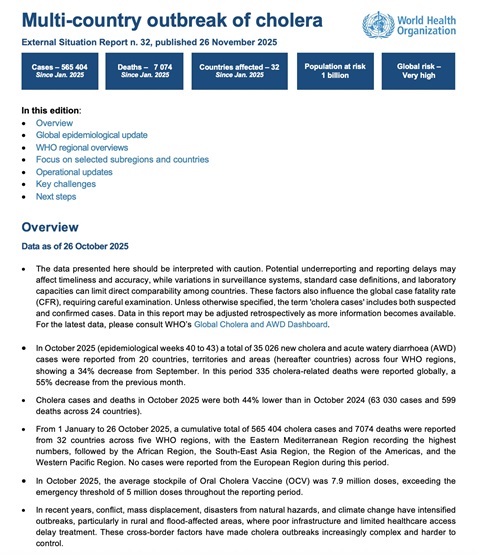Can a probiotic help veterans with traumatic brain injury and PTSD? – Colorado Public Radio

Report on Probiotic Research for Veteran Mental Health and its Alignment with Sustainable Development Goals
Executive Summary
This report details a research initiative investigating the therapeutic potential of probiotics for veterans suffering from Traumatic Brain Injury (TBI) and Post-Traumatic Stress Disorder (PTSD). Led by researchers from the Department of Veterans Affairs and the University of Colorado, the study explores the “gut-brain axis,” hypothesizing that improving gut microbiome health can alleviate neurological and psychological symptoms. This research directly supports the achievement of several United Nations Sustainable Development Goals (SDGs), primarily focusing on health, innovation, and collaborative partnerships.
Advancing SDG 3: Good Health and Well-being
The study is a significant contribution to SDG 3, Target 3.4, which aims to promote mental health and well-being. By seeking novel treatments for PTSD and TBI, the research addresses critical health challenges within a vulnerable population. The project is founded on key observations linking physical and mental health:
- A direct correlation was observed between blast exposure in soldiers and subsequent gastrointestinal distress, suggesting a link between physical trauma and gut health.
- A high comorbidity exists between PTSD and gut-related conditions such as Irritable Bowel Syndrome (IBS).
- The core hypothesis is that targeted probiotics can reduce systemic inflammation, thereby calming the entire system and potentially decreasing symptoms associated with both brain injury and PTSD.
Fostering Innovation and Partnerships (SDG 9 & SDG 17)
This research exemplifies the principles of SDG 9: Industry, Innovation, and Infrastructure by enhancing scientific research to address a pressing health issue. It also embodies the spirit of SDG 17: Partnerships for the Goals through its collaborative framework.
Key Innovations (SDG 9)
- Novel Therapeutic Pathway: The study focuses on the gut-brain axis, an innovative approach to treating conditions traditionally considered purely brain-based.
- Scientific Rigor: Researchers are using a specific probiotic strain, Lactobacillus rhamnosus, to isolate its effects. This methodical, single-strain approach is critical for understanding precise mechanisms, in contrast to broad-spectrum commercial probiotics where the impact of individual strains is difficult to determine.
Collaborative Framework (SDG 17)
- The project is a partnership between the Department of Veterans Affairs, the University of Colorado School of Medicine, and the University of Colorado Boulder, combining clinical, psychological, and physiological expertise to achieve a common health goal.
Core Scientific Concepts and Findings
The study is based on the evolving understanding of the gut microbiome and its impact on overall health. A central objective is to define and promote a healthy microbiome to support mental and physical well-being.
Defining a Healthy Gut Microbiome
- High Alpha Diversity: This is the primary indicator of a healthy gut and is composed of two features:
- Richness: The number of different types of microbes present.
- Evenness: The equitable distribution of the different microbe types.
- Key Players: The scientific view is shifting from a simple “healthy vs. unhealthy” model. It now suggests that health may be determined by the presence or absence of specific “key players”—bacteria that perform critical functions. An imbalance, such as an overabundance of harmful actors or a lack of beneficial ones, can lead to negative health outcomes.
Recommendations and Future Outlook
While the study’s formal results are pending, the researchers provided general recommendations for maintaining gut health, which align with broader public health goals integral to SDG 3.
Lifestyle Recommendations for Gut Health
- Maintain a diverse diet with a high intake of various fruits and vegetables.
- Engage in regular physical exercise.
- Ensure adequate and quality sleep.
For individuals interested in probiotics, researchers recommend consulting independent, evidence-based resources, such as the U.S. Probiotic Guide, which evaluates clinical trial data without conflicts of interest. The final results of this study, expected next year, will provide critical data for developing targeted health interventions that support the global goal of ensuring healthy lives and promoting well-being for all.
SDGs Addressed in the Article
Analysis
- SDG 3: Good Health and Well-being: This is the primary SDG addressed. The article focuses entirely on a health issue, specifically the mental and physical well-being of veterans. It discusses research into a novel treatment for Post-Traumatic Stress Disorder (PTSD) and traumatic brain injury (TBI), conditions that significantly impact health. The study’s goal, as stated by Dr. Brenner, is to “decrease the symptoms” associated with these conditions by improving gut health, directly aligning with the goal of promoting health and well-being for all.
- SDG 9: Industry, Innovation and Infrastructure: The article highlights scientific research and innovation as a means to solve a complex health problem. The study led by researchers at the Department of Veterans Affairs and the University of Colorado represents an investment in research and development (R&D). It describes an innovative approach—targeting the “gut-brain axis” with specific probiotic strains—to address mental health conditions, which embodies the spirit of enhancing scientific research and encouraging innovation.
- SDG 17: Partnerships for the Goals: The research described is a collaborative effort. The article explicitly mentions the involvement of Dr. Lisa Brenner from the “Department of Veterans Affairs and the University of Colorado School of Medicine” and Chris Lowry from the “Department of Integrative Physiology at the University of Colorado Boulder.” This represents a public-public partnership between a government agency and academic institutions, working together to achieve a common health goal, which is central to SDG 17.
Specific SDG Targets Identified
Analysis
- Target 3.4: By 2030, reduce by one third premature mortality from non-communicable diseases through prevention and treatment and promote mental health and well-being. The article directly relates to the “promote mental health and well-being” component of this target. The research aims to find an effective treatment for PTSD and TBI in veterans, which are significant mental and neurological health challenges. The study’s objective to “decrease inflammation, calm the whole system down and perhaps decrease the symptoms” is a clear effort to improve mental health outcomes.
- Target 9.5: Enhance scientific research, upgrade the technological capabilities of industrial sectors in all countries… including… encouraging innovation and substantially increasing the number of research and development workers. The clinical study itself is a direct manifestation of this target. It is a scientific research project involving dedicated researchers (“Dr. Lisa Brenner, a clinical research psychologist” and Chris Lowry) who are exploring an innovative treatment method. The article’s focus on a study that is “just wrapping up” with results to be “released next year” underscores the process of scientific research and development in action.
- Target 17.17: Encourage and promote effective public, public-private and civil society partnerships, building on the experience and resourcing strategies of partnerships. The collaboration between the Department of Veterans Affairs (a public government entity) and the University of Colorado (a public academic institution) is a clear example of the type of partnership this target aims to promote. Their joint effort to conduct a clinical trial leverages the unique strengths and resources of both institutions to address a critical issue for veterans.
Indicators for Measuring Progress
Analysis
- Reduction in symptoms of PTSD and TBI: The article implies this as the primary indicator of success for the study. Dr. Brenner’s goal is to “decrease the symptoms” in veterans. The forthcoming results of the study would presumably quantify changes in these symptoms, serving as a direct measure of progress towards improving mental health (Target 3.4).
- Improvement in gut health markers: The article discusses the link between PTSD and “gut problems, including irritable bowel syndrome.” It also mentions the importance of gut microbiome diversity (“richness” and “evenness”). An implied indicator would be the measurable improvement in these gut-related symptoms and an increase in microbiome diversity in the study participants, linking back to the treatment’s effectiveness (Target 3.4).
- Completion and publication of scientific research: The article states the study is “just wrapping up” and “results will be released next year.” The completion of the study and the dissemination of its findings are tangible indicators of progress in scientific research and innovation (Target 9.5).
- Existence of a collaborative research project: The article’s description of the study involving both the Department of Veterans Affairs and the University of Colorado serves as an indicator of a functional partnership. The project itself is evidence that a partnership has been formed and is actively working towards a shared goal (Target 17.17).
Summary Table of SDGs, Targets, and Indicators
| SDGs | Targets | Indicators |
|---|---|---|
| SDG 3: Good Health and Well-being | Target 3.4: Promote mental health and well-being. |
|
| SDG 9: Industry, Innovation and Infrastructure | Target 9.5: Enhance scientific research and encourage innovation. |
|
| SDG 17: Partnerships for the Goals | Target 17.17: Encourage and promote effective public partnerships. |
|
Source: cpr.org
What is Your Reaction?
 Like
0
Like
0
 Dislike
0
Dislike
0
 Love
0
Love
0
 Funny
0
Funny
0
 Angry
0
Angry
0
 Sad
0
Sad
0
 Wow
0
Wow
0












































































